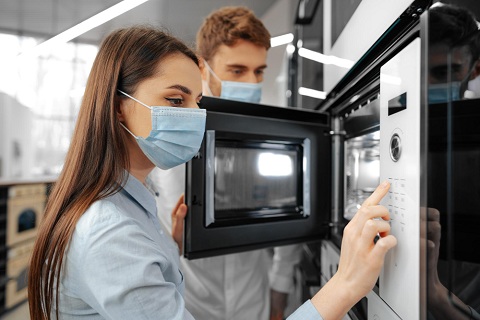Microwaves have become an integral part of modern kitchens, offering convenience and efficiency in preparing meals. However, concerns about the potential health risks associated with microwave radiation have led to widespread debates and misinformation. In this article, we will navigate through the realm of microwaves and health, examining the facts, dispelling myths, and shedding light on the true nature of radiation exposure. Let’s embark on a journey of understanding the science behind microwaves and their impact on our health.
How Microwaves Work: A Closer Look
Microwaves, as the name suggests, utilize microwave radiation to heat food quickly and effectively. These electromagnetic waves are non-ionizing, meaning they lack the energy to alter the structure of atoms or molecules in the way that ionizing radiation, like X-rays and gamma rays, can. Microwaves emit waves that cause water molecules within food to vibrate, generating heat in the process. This rapid heating mechanism is what makes microwaves a time-saving kitchen appliance.
The Safety of Microwave Radiation
Dispelling the Myth of Ionizing Radiation
There’s often confusion between ionizing and non-ionizing radiation. Ionizing radiation possesses enough energy to remove tightly bound electrons from atoms, potentially causing cellular damage and increasing the risk of cancer. On the other hand, non-ionizing radiation, emitted by microwaves, lacks this energy level and is generally considered safe. The World Health Organization (WHO) and other reputable health organizations assert that the non-ionizing radiation emitted by microwaves doesn’t pose significant health risks.
Microwave Leakage: Addressing Concerns
One common worry is microwave leakage, which could expose individuals to higher levels of radiation. Modern microwaves are designed with safety features and strict regulations to prevent leakage. Regular maintenance and proper usage further mitigate the risk. If you suspect your microwave is leaking, it’s wise to have it inspected by a professional.
Separating Fact from Fiction: Debunking Myths
Myth: Microwaving Food Depletes Nutritional Value
Reality: Microwaves, like other cooking methods, may cause some nutrient loss due to heat sensitivity. However, the impact is generally minimal, and microwaving can sometimes preserve nutrients better than traditional cooking methods due to shorter cooking times.
Myth: Microwaves Create Harmful Compounds in Food
Reality: Microwaves do not create harmful compounds. Cooking methods that use high temperatures, like frying and grilling, can produce certain compounds that might be of concern. Microwaving, with its lower temperatures, actually helps retain more antioxidants in food.
Myth: Microwaves Can Cause Cancer
Reality: Scientific consensus holds that non-ionizing radiation from microwaves is not linked to cancer. Extensive research has found no credible evidence supporting such claims. The energy level of microwave radiation is insufficient to damage DNA and trigger cancerous mutations.
Expert Insights and Recommendations
We spoke to Dr. Emily Rodriguez, a renowned physicist specializing in radiation and health, to gain further insights into the topic. According to Dr. Rodriguez, “Microwaves are a safe and efficient way to cook food. The non-ionizing radiation they emit is far less energetic than the radiation from the sun. It’s important to base our understanding on solid scientific evidence.”
Microwaves and Health: Separating Fact from Fiction in Radiation Exposure
The key takeaway is that microwaves are not the health hazard they are sometimes portrayed to be. With proper usage and maintenance, these appliances offer a convenient and safe way to prepare meals. The scientific consensus, along with expert opinions, attests to the minimal risks associated with microwave radiation.
Frequently Asked Questions (FAQs) about Microwaves and Health: Separating Fact from Fiction in Radiation Exposure
No, microwaves emit non-ionizing radiation, which is considered safe and does not pose health risks.
Like other cooking methods, microwaving may cause some nutrient loss due to heat sensitivity, but the impact is generally minor.
No, scientific research confirms that non-ionizing radiation from microwaves is not linked to cancer.
Modern microwaves are designed with safety features to prevent leakage. Regular maintenance and proper usage further reduce the risk.
Microwaves can preserve nutrients better than traditional methods due to shorter cooking times and lower temperatures.
Microwaves are safe and efficient appliances for cooking. The scientific consensus supports their minimal impact on health.
Conclusion
As we’ve explored the realm of microwaves and health, we’ve uncovered the facts surrounding radiation exposure and dispelled the myths that often cloud the conversation. With an understanding of how microwaves work and the scientific consensus on their safety, you can confidently use this kitchen appliance to simplify your cooking routine. Remember, the key to healthy microwave use lies in proper maintenance, adherence to safety guidelines, and reliance on credible sources of information.


